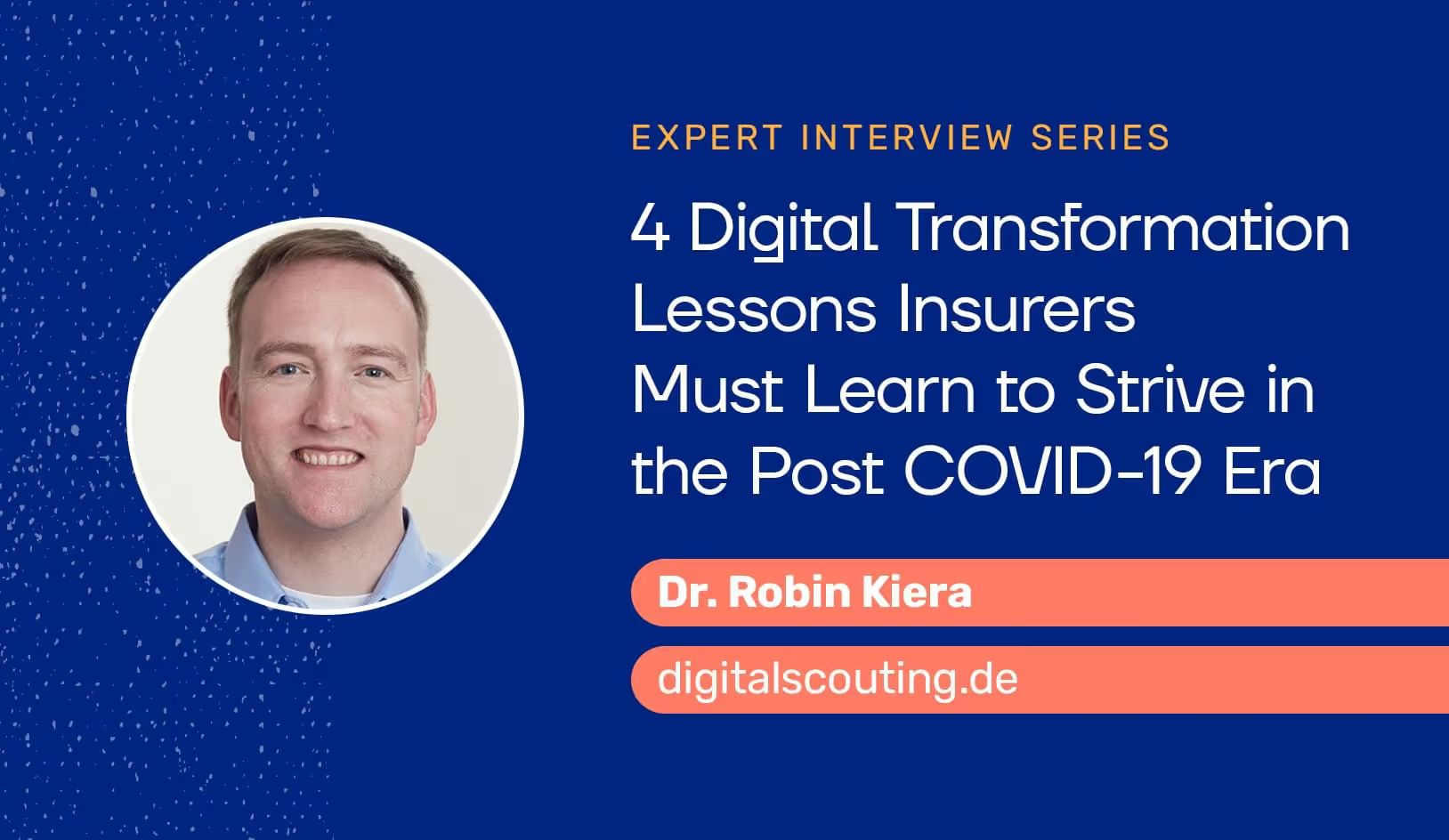Dr Robin Kiera is the founder of Digitalscouting.de, a platform with over 70.000 followers for thought leaders, entrepreneurs and senior managers in finance and insurance to share best practices, lessons learned and up-to-date views on tech and business trends around the world.
Lesson 1: Leadership is going to play a pivotal role
The first takeaway is that digital transformation is not a toy. It’s the core. It’s the core of what we all need to do. We need to optimize our existing processes. We need to adopt new technology.
We need to go out there and find partners that are quickly enabling us to transform our operations. We cannot do it all by ourselves. I mean, if you would have started to build an own e-signature tool on March 16th, good luck. It would be finished probably in 2024. You need to go out there. You need to go to the e-signature people and say, “Okay, who’s the best? Let’s do it.” It’s a completely different way of thinking. Digital transformation is not a toy. It’s not a fad. It’s something that’s totally overdue. I think the last people need to wake up in the industry.
And to be quite honest, I also think it’s the time for advisory boards. We still have decision-makers in insurance companies who do fake innovation – only scratching the surface without transforming the core of their operations. They don’t have a vision. They don’t go to other industries for advice, expertise, and inspiration. Those companies will not be able to grow exponentially.
It’s time to act and replace those leaders. I think that’s something we need to talk about. Do we have the right people in the right positions at the right time? I think the big problem lies in the boardrooms.
Lesson 2: Insurers are more resilient than many assumed
The second lesson is that we are stronger than we thought. That gives me hope.
If you would have asked me back in January 2020 if I thought if the insurance industry is able to go remotely globally in days, I would have said, “That’s insane.” The thought alone would sound insane.
But it happened. We did transform faster than anyone thought possible. So I think we’re way stronger and more capable of doing things right. I heard even stories from those naysayers that said nay to all the things innovators wanted to do. They were the first to cry for a laptop, and then access to VPN, and work from home setup.
The big question is, can we continue this momentum? Can we really not fall back into old habits that have been with us for over 150 years?

Lesson 3: Silent risk is dangerous
We have silent risks in our portfolios. I think that’s something super dangerous. It’s dangerous because the insurance policies and the pricing is not built for certain silent risks.
Let’s take for example the business interruption policies. They were not built for a situation where not just a specific company, but the whole economy breaks down. It’s a big difference.
Insurers cannot pay all these damages. Why? Because they have the risk pools formed, and if the whole concept of a product is that you have one of them, 10,000 companies having a claim, then with a little surplus, you can build your product there, and you can calculate. But if everybody goes broke, insurers go broke too.
We should go through our policies, see where do we have silent cyber risks, where do we have silent pandemic risks, where do we have silent civil unrest risk, and all these things.
But also communicate this very clearly with the client. Not say, “Oh, yeah, everything is covered.” No, certain things, they cannot be covered. War cannot be covered, you know? I think that’s an important lesson to understand, to educate the client, but also to understand as an industry ourselves.
Life is changing, things are happening, black swans are around. We need to go to our policies and really make sure that we have the best coverage for the client that absorbs what he can get in the situation, the risk is covered, but when we have a situation that is mathematically not possible to cover for a private institution, then we need to change that and to go through it.
Lesson 4: Insurers must learn to communicate better
The fourth lesson is that insurers must learn to communicate with customers more effectively.
Business interruption policies are being the most prominent example currently. In many cases, we did not communicate correctly with the customers. We did not try to educate the public.
And now the customers are pissed off. We hope that the storm blows over and that the storm doesn’t hit the roof too badly. That’s our strategy when it comes to these things.
I wish that we would go out into the world and actually educate the people, talk about these topics, We need to explain to the customer that insurance is about risk pools, and customers must have a clear understanding of what is and what isn’t covered by their policy.
So, to sum it up:
- Digital transformation is not a toy – it is at the very core of our business
- Insurers are more resilient and susceptible to change than many anticipated, but we must strive to keep the momentum
- We must be aware of silent risks and be extremely careful into how we deal with them
- Insurers must do a better job in communicating what we actually do all-day
Expert interview series
Dr Robin Kiera is the founder of Digitalscouting.de, a platform with over 70.000 followers for thought leaders, entrepreneurs and senior managers in finance and insurance to share best practices, lessons learned and up-to-date views on tech and business trends around the world.





